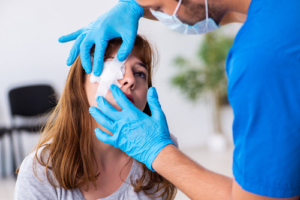Is Age the Only Factor for Developing a Cataract?
Do you have cataracts that make it harder to see? You may be wondering how they developed.
A cataract occurs when the natural lens in your eye becomes cloudy. As cataracts grow and develop, they gradually affect your sight. Eventually, they can rob you of your vision without treatment.
Age is the leading cause of cataracts. However, other factors can lead to cataracts as well. Keep reading to learn more about cataracts, including how age and other factors can cause the condition.
Age

Cataracts are a normal part of the aging process for most people. Approximately 90 percent of Americans will have a cataract by the time they turn 75.
Cataracts start developing when proteins in your eyes begin breaking down. For most people, this is around the age of 40.
These proteins start clumping together. When this happens, it makes the natural lens cloudy and much more challenging to see through. As the lens becomes less opaque, this is known as a cataract.
Cataracts become more severe over time as you get older. The clouding of the natural lens only worsens as your vision continues to deteriorate.
Congenital Cataracts
Although most cataracts occur due to aging, it’s not the case for all. Some infants are born with congenital cataracts.
You can have a cataract in one or both eyes if you have congenital cataracts, but different things can cause it. These may include Down syndrome and infections like rubella and measles.
You can also inherit congenital cataracts. Early treatment of these is vital for any children with congenital cataracts.
Smoking
Smoking is terrible for staying healthy, and your eyes are no exception. Both smoking and secondhand smoke significantly increase your chances of developing cataracts.
The CDC reveals that smokers are twice likely to develop cataracts than non-smokers. If you’re a smoker, it’s best to quit as soon as possible.
Eye Injuries

Severe trauma to your eye can lead to early cataracts. Traumatic cataracts may form due to penetrating eye trauma, chemical burns, blunt force, electric shock, a puncture, or a cut.
Eye injuries from ionizing radiation and infrared energy might also speed up the formation of cataracts. Traumatic cataracts can appear soon after your injury or form several months or even years later.
Family History of Cataracts
If you have a family history of cataracts, you also have an increased risk of developing the eye condition. Although everyone is likely to have cataracts if they live long enough, genetics play a much more significant role in their development. Tell your eye doctor if you have a family history of cataracts or another eye condition.
Diabetes
If you have diabetes, it’s necessary to keep it under control. Diabetes that isn’t well managed can wreak havoc on your eyes.
It’s estimated that those with high blood sugar levels are about 60 percent more prone to developing cataracts than people without diabetes.
Diabetic cataracts form early and tend to advance faster. Higher blood sugar levels that aren’t under control can also lead to the development of diabetic retinopathy.
Certain Medications
Some medications have links to cataract formation. They include:
Corticosteroids
Long-term use of corticosteroids can induce cataract development.
Cholesterol Medications

Taking statins for your cholesterol puts you at an elevated risk for cataracts.
Anti-Cancer Medications
Some medications used to treat leukemia increase your chances of getting cataracts.
Antipsychotics
There appear to be connections between phenothiazine neuroleptic medications and the development of earlier cataracts.
Prolonged Radiation Exposure
Ultraviolet radiation from the sun can harm your eyes. Spending a lot of time in the sun without adequate eye protection can speed up the formation of cataracts. Radiation used to treat some forms of head and neck cancers is known to cause cataracts.
Previous Eye Surgery
Acceleration of cataract formation can happen after eye surgery, particularly if you’ve undergone a vitrectomy. Vitrectomies are performed to treat problems with your vitreous or retina.
Obesity

If you’re considered obese or overweight, it increases your risk of developing cataracts. That’s because obesity increases your risk of diabetes, which contributes to early cataracts.
High Blood Pressure
Untreated high blood pressure can strain the blood vessels in your eyes and cause your optic nerve to swell. This strain is commonly associated with the early and rapid development of cataracts.
Glaucoma Treatment
Glaucoma is a group of eye diseases that cause a buildup of intraocular pressure or IOP. If your IOP is too high, it damages your optic nerve and leads to permanent vision loss.
Glaucoma itself doesn’t result in cataracts. However, some glaucoma treatments and procedures can exacerbate the progression of cataracts. Your risk of developing cataracts increases after undergoing procedures like trabeculectomy or a tube shunt.
Signs and Symptoms of Cataracts

You may not notice you have cataracts, especially at first. They can take years to form, meaning you may not have any symptoms until later.
But as cataracts progress, symptoms become more noticeable and severe. You may have cataracts if you experience the following symptoms:
- Blurry or cloudy vision
- Increased sensitivity to light
- Poor night vision
- Seeing halos and glare
- Needing brighter lighting
- Double vision in one eye
- Colors appearing faded
- Frequent prescription changes
When Should You Have Cataract Surgery?
Cataract symptoms often worsen over the years, making it hard to enjoy your favorite pastimes or perform simple, everyday activities like reading, driving, and cooking. When cataracts start interfering with your quality of life and a stronger prescription and brighter lighting no longer help you see clearly, it could be time to have them removed.
Cataract surgery is a safe and highly effective procedure that restores your sight and ability to see clearly.
Protect Your Vision

Regular eye exams at Eye Consultants of North Dakota are the best way to diagnose cataracts early. Timely detection and treatment of cataracts can prevent significant vision loss and reduced quality of life.
Do you think you may have cataracts? Find out by scheduling an appointment with the experts at Eye Consultants of North Dakota in Fargo, ND, now!



